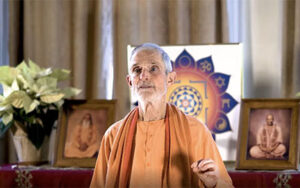
Photo by Abhijeet Singh via Pexels.
Contentment is a deceptively simple concept that offers tremendous benefit if we fully embrace its practice. It is referred to as santosha in the Yoga Sutras of Patanjali and is not so easy to master because the habit of wanting and achieving is so deeply ingrained in us. It does not mean that we give up having goals and striving for them, or give up enjoying sensory experiences.
But it does imply that we reflect on the prevailing messages of our culture that tell us that something pleasurable is a means to happiness. This can become an unconscious belief that distorts the present moment with anticipation over the next thing to do or get, and is never enough as it is.
Contentment does mean that we are at peace with what we have now and with ourselves as we are, even as we strive to learn and grow. It does mean that we can enjoy the process of pursuing our goals, giving ourselves fully to them, without fear of failure.
I really am drawn to this idea and teaching but I struggle to practice it when my to-do list gets too big for my comfort, or when some challenging issue remains unresolved. At such times, I can’t seem to help feeling that I’ll be happier after I finish a project or after this issue is resolved. I find myself pushing my limits, working longer hours, ignoring my resolves for getting exercise and enough sleep, and or doing everything with a simmering stew of anxiety on the back-burner of my mind.
It has really helped me to make a conscious effort to practice contentment. One way is to start my day, after my morning meditation, affirming that my essential nature is joy, and this joy is independent of anything that happens. It feels so good to assert this truth and really try to feel it, reminding my mind that nothing can make me happy or sad.
I encourage everyone to use this month to experiment with santosha by pausing and reflecting, “Can I be at peace with this moment as it is?” “Do I really have to have (fill in the blank) before I can be happy?”
This will certainly be challenging in some situations, but when we do succeed to feel moments of a natural inner contentment, we’ll be inspired to keep practicing.
About the Author:
 Swami Ramananda is the Executive Director of Integral Yoga Institute in San Francisco, a certified Yoga therapist, and a founding board member of the Yoga Alliance. He leads beginner, intermediate and advanced-level Yoga teacher training programs in San Francisco and teaches throughout the world. Having dedicated his life to teaching Yoga for nearly 50 years, Swami Ramananda is highly-respected senior teacher in the Integral Yoga tradition in Yoga communities worldwide. Swami Ramananda co-developed the Stress Management Teacher Training program with Swami Vidyananda, has trained many teachers to bring Yoga into corporate, hospital and medical settings, and has taught mind/body wellness programs throughout the US and abroad. He is also a co-founder of The Spiritual Action Initiative (SAI) which brings together individuals committed to working for social justice for all beings and for the care and healing of our natural world.
Swami Ramananda is the Executive Director of Integral Yoga Institute in San Francisco, a certified Yoga therapist, and a founding board member of the Yoga Alliance. He leads beginner, intermediate and advanced-level Yoga teacher training programs in San Francisco and teaches throughout the world. Having dedicated his life to teaching Yoga for nearly 50 years, Swami Ramananda is highly-respected senior teacher in the Integral Yoga tradition in Yoga communities worldwide. Swami Ramananda co-developed the Stress Management Teacher Training program with Swami Vidyananda, has trained many teachers to bring Yoga into corporate, hospital and medical settings, and has taught mind/body wellness programs throughout the US and abroad. He is also a co-founder of The Spiritual Action Initiative (SAI) which brings together individuals committed to working for social justice for all beings and for the care and healing of our natural world.

